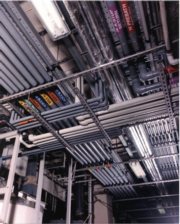Delivering the benefits of prefabrication

The reality of prefabricated pipework is to streamline work on site and to enjoy the benefits of carrying out much work under quality-controlled factory conditions.
Martyn Rowlands, Head of Marketing for Durapipe UK, discusses the developments regarding prefabrication of pipework within the building services industryOff-site fabrication is a relatively new way of thinking within the building-services industry. It is only over the past decade that specifiers, contractors and end clients have begun to look into the benefits of prefabricating materials, such as pipework, off-site. Although the use of prefabrication in the building-services industry is increasing, its advantages are not being fully realised by many. So far as pipework is concerned, there is still a case to be made for educating people in the industry of the benefits of prefabrication.
Positive improvements The industrial and water-treatment sector has for many years been embracing the positive improvements that can be achieved using prefabrication. However, prefabricating pipework off-site has only been considered by the building-services market since the late 1990s, following the publication of Sir John Egan’s report ‘Rethinking construction’ in 1998. This report recommended prefabrication as a way to help improve efficiency on-site and had a particular impact on the industry and inspired the first projects that utilised this way of working. The principles and benefits of prefabrication remain the same on any project, but the scale can vary greatly from simple pipework modules through to complete service pods incorporating a variety of pipework systems and electrical services for a building. Prefabrication is particularly popular within heavily serviced developments, such as hotels and apartments. These buildings often have repetitive pipework arrangements on every floor, and it is significantly easier to create several modules in a factory than it is to repeat the process on-site. Many clients have seen the benefits that off-site manufacture can bring, particularly in the construction of complex systems. It is significantly easier to construct such systems in factory conditions at ground level, compared with on-site installers often having to work overhead or at height, which is labour intensive and costly. A noticeable improvement will also be seen in the quality of the end product, as pipework modules are made under quality-controlled factory conditions rather than on a busy site where pipe fitters and installers are working alongside other tradesmen and are all under pressure to complete the job quickly. Other problematic areas in construction projects can also be improved using prefabrication. For example, the lack of trained pipework fitters has been a particular issue within the industry. Employing an outside company to prefabricate pipework eliminates this problem, resulting in a more cost-effective solution for the contractors. Another benefit is that prefabrication helps address health-and-safety concerns on-site, as a factory environment is considerably safer than a construction site.
Plastics Plastic pipework systems offer several benefits in prefabrication, not least the fact that they save significant time and cost during the installation process. Employing an outside company to prefabricate pipework can be costly, so it is important that it can be done as quickly as possible to minimise costs. Also, plastics can be solvent or fusion welded, offering a quick and simple jointing technique. When coupled with the fact that plastic materials do not need to be coated or painted and are easy to handle, the labour time involved in installation is significantly reduced when compared with traditional materials. Manufacturing pipework modules off-site can save significant time. Plastic is a lightweight material, which is much easier to transport and manoeuvre into position on-site, meaning that time efficiencies can also be realised when installing the modules, even when they have been fabricated into complex pipework spools. The increase in the prefabrication of pipework has developed hand in hand with a number of companies, which now offer prefabrication services. Durapipe UK, for example, works with specialist companies such as Engineering Services to ensure it can offer customers the benefits of prefabrication. In addition to the independent fabricators, contractors are increasingly considering prefabrication and setting up their own facilities to undertake the work in-house and save on the costs involved. The benefits of prefabrication are being realised by some within the industry, but there is still a way to go. BSRIA estimates that only 60% of UK construction projects are completed on time and only 49% within budget. If contractors are to improve construction times, prefabrication is a step in the right direction. People within the industry need to be looking at projects where prefabrication has been used and consider how it can be adapted to fit their individual needs.
Martyn Rowlands is head of marketing for Durapipe UK.
Related links:
Related articles:


